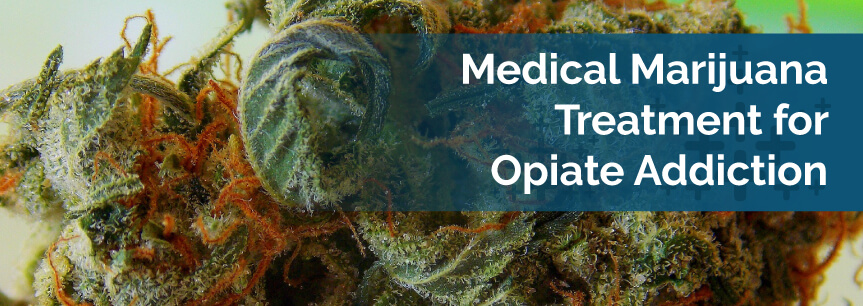
Medical marijuana is quickly becoming one of the wonder-medicines of our time. Not only can it help you if you’re in chronic pain with a serious illness such as cancer or multiple sclerosis, but it’s also now considered to be a treatment that has a significant impact on you if you’re addicted to opiates.


This work is licensed under a Creative Commons Attribution-NoDerivs 3.0 United States License. If you like our infographic, feel free to share it on your site as long as you include a link back to this post to credit Marijuana Doctors as the original creator of the graphic.
According to information from the National Institute on Drug Abuse, in 2012 there were an estimated 467,000 U.S. citizens addicted to heroin, and 2.1 million people suffering from a substance use disorder relating to prescription opioids.
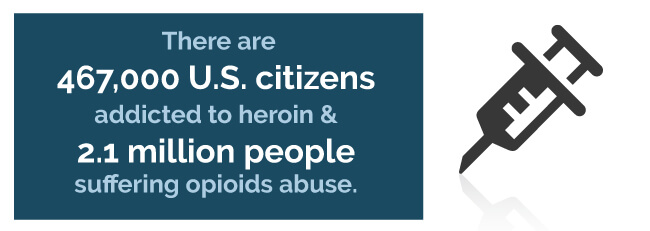
In addition, according to Science Daily, there are over 76 million people in America today who suffer from chronic pain conditions. However, these types of pain conditions are the ones that are managed least effectively.
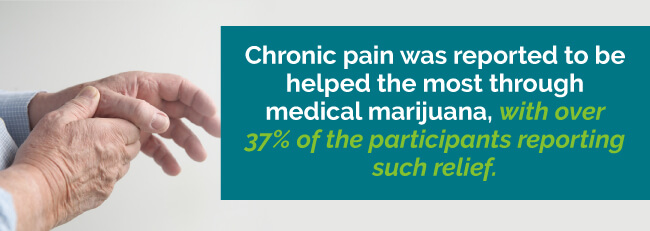
It’s, therefore, perhaps no wonder that so many U.S. citizens are fighting a battle against opiate addiction as they desperately try to control their pain.
In this in-depth article, we look at the facts that you need to know about medical marijuana and opiate addiction and how marijuana for opiate withdrawal and detox can help you.
First, it’s important to understand what opioids are, their history and what they are used for. Used for centuries, opioids were first extracted in the form of opium from the poppy plant. Opioids are narcotics that block feelings of pain. This is why they’re so frequently abused and often lead to dependence and addiction.
Opioids are often used to treat pain from either surgery or from a serious injury. They are meant to be used on a short-term use basis. Opioids attach to receptors within your spinal cord, brain and in other parts of your body and reduce the pain messages that are sent to your brain, thus reducing any feelings of pain you may have.
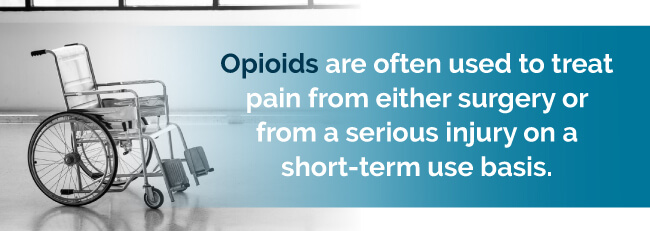
Tolerance to opioids is common if you’re taking the drugs long term. You may have initially begun to take the drugs in small doses, but you’ve needed to up these over time to achieve the same pain-relieving effect.
In addition to pain relief, however, there are other effects opioids can have on your body. These include:
If you feel you may have a problem with opiates, read on for help and advice.
There are various opioids available today. Some of these include:
Most of these drugs are taken by mouth, but Fentanyl is available to be absorbed through your skin via a patch. Prescription opioids and heroin are medically similar to the endorphins our body makes to relieve pain naturally. Opioids can either be natural and made from a plant, semi-synthetic (modified from a plant in a lab), or fully synthetic which means they’re entirely man made.
Opiates should always be taken as prescribed by your doctor as they have the capacity to lower your heart rate, slow down your breathing and also decrease your blood pressure. Opioids may affect your ability to drive and operate machinery as well.
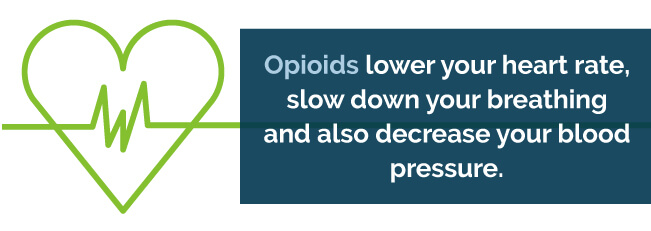
Other common side effects include thought and memory problems, constipation, drowsiness, vomiting and nausea. You should never stop taking any opioid medication without checking with your doctor who can advise you on the best course of action.
You should also always exercise caution if you’re taking opioids alongside any other drugs or medications as there may be interactions. Opioids can be particularly dangerous if you take them alongside the following:
Addiction and tolerance are two separate things. Tolerance means you’ve built up a diminished response to a specific drug over repeated use. On the other hand, dependence means your body has adapted to the physical presence of the drug. It’s very common to develop a dependence on opiates within quite a short space of time.
If you’ve become physically dependent, you’ll experience withdrawal symptoms when you try to stop taking the drug. Some symptoms of opiate withdrawal include:
You’ll find you need to take higher and higher doses to get the same effect when you become dependent on opiates. This is dangerous in itself as higher doses lead to more dangerous side effects and signify that you have a real problem going on that needs to be addressed.
It’s easy to confuse physical dependence and tolerance with addiction. You know you’re addicted if you:
Of the people taking opioids as genuine pain relievers, around five percent become addicted after taking the drug as directed for a year. In addition, tolerance and dependence are common when you take opioids, and you can become physically dependent even if you’re not addicted.
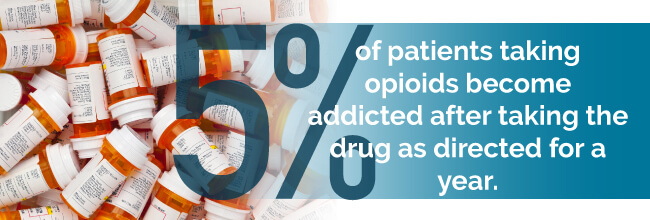
As with all drugs, there are side effects and risks to taking opioids. If you feel you’re experiencing issues with the drug and that you need help, it’s crucial you seek advice and support as soon as you can.
Opioids can make a huge difference in your life if you’re dealing with moderate to severe pain. Taking the drugs can be an incredibly effective therapy so long as you use them in accordance with your doctor’s instructions and guidance and are taking them on a short-term basis. However, they can become problematic if you’re taking them illicitly, over the long term or not in accordance with your physician’s instructions.
If you’re reading this, you might be considering your escape from the cycle of opiate addiction. If you live in a state where medical marijuana is legal and you’re taking opiates for a chronic pain condition, it’s a good idea to get the ball rolling in terms of getting a prescription.
You may have already attempted to kick the habit on numerous occasions and found that the opiate is just too strong for you to keep away from. This is where medical pot takes the edge off and why so many people attribute their success in quitting drugs to the substance.
Medical weed can help you get through the physical and mental symptoms of opiate withdrawal. Thankfully physical withdrawal takes around a week or so, but it’s the psychological symptoms that can be the most damaging. Pot can significantly help you in your battle with insomnia, agitation and anxiety.
If you’re wondering about the benefits of using medical marijuana to help wean you off opiates, numerous studies have touted its beneficial offerings. Studies have shown that there is a decreased number of opiate overdose fatalities in states that have legalized cannabis for medical use.
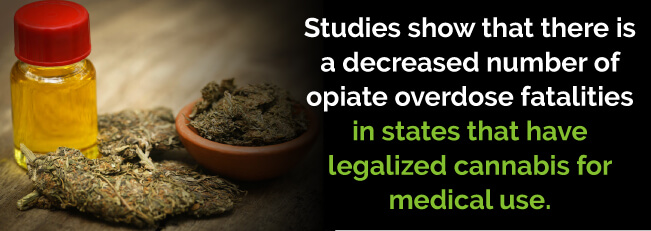
Medical cannabis is used to treat a wide range of health issues including, chronic pain, muscle spasms, glaucoma and post-traumatic stress disorder. With recent studies pointing to it also having a significantly positive effect on people trying to quit opiates, the outlook is very positive.
Anecdotal evidence from recovering addicts suggest that using marijuana for opiate detox actively alleviates uncomfortable symptoms like inability to sleep, nausea, restless legs and extreme back pain.
According to a 2015 report by the Partnership for Drug-Free Kids, there are hundreds of people in Massachusetts being treated with medical pot in order to control their addiction to opioids. There have been so many opiate-linked deaths in the state that doctors are getting patients on to non-addictive cannabis as much as they can to stop more fatalities from occurring.
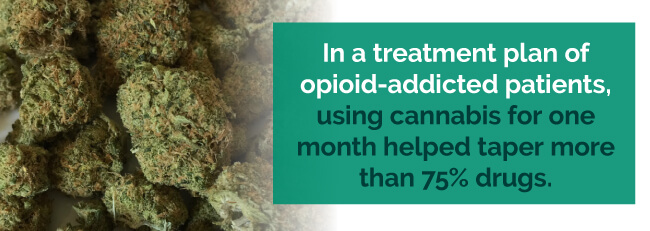
In a treatment plan of around 80 opioid-addicted, muscle relaxer-addicted and anti-anxiety medication-addicted patients, using cannabis for one month helped taper more than 75 percent off drugs. This is extremely exciting news for all concerned.
In August 2017, the NIH (National Institute of Health) awarded $3.8 million to Albert Einstein College of Medicine and Montefiore Health System to research how medical marijuana can help treat opioid addiction in adults with chronic pain. This will be the first long-term study to see how medical marijuana can help reduce opioid use in adults suffering from chronic pain conditions.
Further, University of Florida will be conducting a medical marijuana study over the next five years that will test medicinal cannabis as an alternative to opioids for AIDS/HIV patients. The National Institute on Drug Abuse will be funding the study and could provide additional resources that could lead to the approval of new qualifying conditions for medical marijuana.
If you’re suffering the ill effects of opiate addiction and are desperately trying to withdraw from drugs, it’s likely that you’ll be in pain as you make the transition. Chronic pain can seriously interfere with your quality of life, and if you’ve been using opioids for a long time, you’ve probably developed a tolerance to their painkilling effects.
You may also be feeling depressed, nauseous, drugged and constipated because of taking opiates. With this in mind, there have been many reports from people taking opiates for pain relief who have managed to either quit taking opiates entirely or at least significantly reduce their dose by taking cannabis instead. They also no longer have to put up with the uncomfortable side effects of opiates.
Interestingly, many patients say that their use of cannabis doesn’t do so much as take their pain away. Instead it makes them less preoccupied with their discomfort so they can ignore it.
Medical pot helps in two significant ways:
Quitting opiates cold turkey can be very dangerous and can bring on extreme withdrawal symptoms and even convulsions. It’s thought by many that medical marijuana is a positive way forward in the treatment of opiate addiction.
The two most widely-recognized active ingredients in cannabis are:
CBD doesn’t provide you with a “high” type of feeling that the active ingredient THC does.
When you take an opiate drug, the opioids attach to receptors in your gastrointestinal tract, spinal cord and brain and release dopamine, which is responsible for pain relief. Your body can’t make huge amounts of dopamine by itself, so it becomes reliant and accustomed to this new way of creating the substance. When you’re addicted, you become desensitized to its effects and need more of the drug, increasing your risk of overdose.
One of the most popular treatment methods for withdrawal from opiates right now is methadone. You need to go to the methadone clinic to receive a controlled dose that makes your symptoms easier to manage. The problem with this is that methadone is yet another opioid, and it’s possible for you to overdose on the substance. You also need to go to a clinic to take methadone, and this can be a problem if you have a low income or no transportation.
It’s for reasons that people who are concerned about the side effects of other drugs used to wean them off opiates are opting for the natural alternative. There is significant anecdotal evidence also to suggest that pot is good for helping you to relax and to feel happier about the world in general.
All-in-all, CBD could be an effective pain management tool that has none of the concerning side effects of many regular drugs that help wean you off opiates. Rather than trading one addiction for another, medicinal pot seems to allow you to live life again free from the specter of side effects.
Although there are many thousands of lives lost annually due to overdosing on opiates, no one has ever lost their life due to taking too much pot. The Centers for Disease Control and Prevention found that in 2015 there were nearly 22,000 fatalities linked to taking prescription opiates. According to a press release from The JAMA Network states that have legalized medical pot seems to have lower opioid overdose death ratesthan states where there are no marijuana laws.
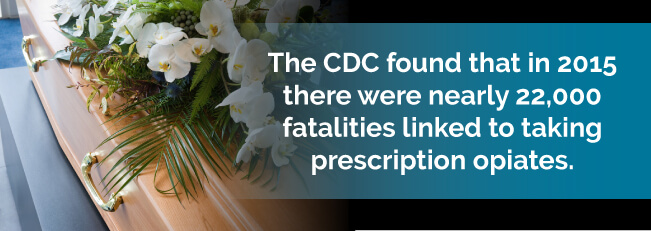
Interestingly, results from the study in question found that states with medical cannabis laws has an annual opioid overdose rate that’s a huge 24.8 percent lower than average.
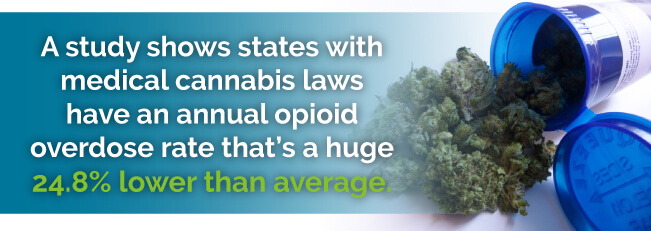
Cannabis is a plant. It’s not addictive and has no side effects. All man-made drugs have the potential for unwanted symptoms relating to their use. Which would you rather take — something natural to help get you through your addiction or a prescription pill like Suboxone that comes with its own addiction-forming worries?
There are a few main and mostly addictive drugs you might be given if you’re trying to quit opiates. These include:
Trading one addiction for another is no way to kick your opiate habit. Why risk your health and well-being when you can take medical pot to help you instead?
Detox is only one part of your lifelong journey toward healing. You might find it beneficial to join a local support group where you can address the issues that made you develop your addiction originally, as well as discuss strategies for avoiding being tempted in the future.
Quitting drugs is a huge achievement, and it’s hard sometimes to battle against your cravings when you go it alone. Opioid addiction is much more than just a physical dependence on drugs. Long after you take marijuana for opiate detox, you’re still at risk of relapsing, especially due to:
All the above and more can create an almost-irresistible urge to resume taking drugs. But when you attend counseling, you’ll find you can learn to cope with anything life throws at you without resorting to ruining all your hard work and going back to opiates.
Ensure you surround yourself with positive people when you’re quitting any drug, including opiates. You need a supportive and loving environment rather than one where your friends aren’t taking you seriously as they’re also using. In conjunction, and if used correctly, medical marijuana and opiate addiction are a good combination to help you get your life back on track.
There is an incredible life available to you when you’re not taking opiates. This will become more and more apparent as you wean yourself off the drugs by taking medical pot.
As we found out earlier, states with medical pot laws have far lower opioid-related fatalities than states without these laws. With this in mind, as well as the fact that the majority of the nation’s fatal overdoses on opiates involve people who hold legitimate prescriptions, if you’re suffering from chronic or severe pain which you’re taking opiates for and you live in a state where medical pot is available, you should be able to get marijuana treatment for opioid addiction.
There is ongoing research coming out constantly in support of pot being a wonder-drug in terms of helping you quit opiates, and it may only be a matter of time before it’s more widely used and better accepted by the medical community as a whole.
In fact, there is new evidence published by Columbia University researchers showing that people given THC from the marijuana plant during their recovery from painkiller addiction were more likely to complete their course of treatment and suffer from less pronounced withdrawal symptoms.
A dosage of 30 grams of dronabinol or a placebo were given out among 60 patients on a daily basis. The ones given the form of THC experienced far less severe withdrawal symptoms than the people on the placebo. Interestingly, people who smoked dope during their outpatient treatment reported far less negative health effects like anxiety and insomnia than people who didn’t smoke.
The field of medical marijuana is a very exciting one that promises so much over the months and years ahead. What is also clear is that there is a growing and significant body of evidence to show that pot is no longer a substance that should be associated with kids in high school or college dropouts. It is, in fact, likely to be lauded as the medical breakthrough-drug of our time.
If you are searching for a medical marijuana doctor or looking for a marijuana dispensary, let us here at www.marijuanadoctors.com help. Please use our convenient search to locate a cannabis doctor or medical marijuana clinic in your area.
No Information on MarijuanaDoctors.Com should be used to diagnose, treat, prevent or cure any disease or condition. You can view our Full Disclaimer here.